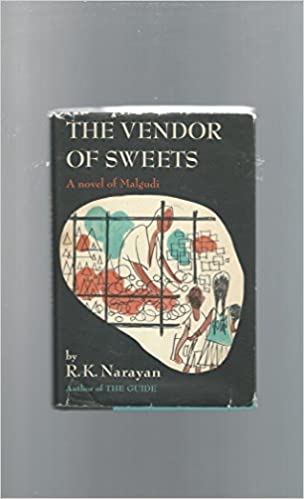Literature is the mirror of our civilization. The Indian writer R.K.Narayan is a bright light ray who illuminated the live quality of that precious mirror. So he is a sprinkling star in the literary world. Even though he is reputed as R.K.Narayan, his real name is Rasipuram Krishnaswami Iyer Narayanaswami. This great novelist always tried to highlight the social context and everyday life through his characters. He created his imaginations around a fictional South Indian town called Malgudi. Always Narayan presented a broad area of ordinary life style in India. Even his writing style which generates humour captivates our hearts. By reading his books we can realize the delicacy of Indian culture, traditions and customs very well. Ultimately he represents the identity of India. In the modern materialistic race, people forget their grace. They are running behind the glitters by pushing each other. As a result, they forget their uniqueness and ethics. Through Narayan’s books, such Indians can re-learn their identity. Not only for Indians, he gives universal theorems from his books which are essential to understand the real irony of our lives.
“The Vendor Of Sweets”, is one of his best novels and it is woven around a traditional and conventional sweet maker called Jagan. Somehow, there is a doubt whether this is an indirect representation of the author’s biography. Through the life of Jagan, the writer depicts the current changes occurring in the minds of Indians and their culture due to western influence. He brings out several themes such as generation gap, the clash between tradition and modernity, the religious beliefs, the conflict, traditional caste system and marriage through the life of Jagan.
Jagan, a 55 year old simple resident of the South Indian suburb Malgudi, runs a successful business of his own as a sweetmeat vendor. This novel greatly represents his role as a successful businessman and also as an unsuccessful father. Due to his own fault, he and his only son Mali become unsuccessful people in their lives.
In this novel the conflict is primarily between the father, Jagan and the son, Mali. So the generation gap between them comes into the play naturally by itself throughout the novel. However it is not just this generation gap alone that led to the conflict between them. Certainly the impact of this generation gap is gravely enhanced by many factors externally. They are their education and their social influence, attitudes, needs and interests, their outlook to life, society and world on one hand and on the other, the rapid changes taking place in the Indian society, culture and traditions due to western influence.
Jagan is an extremist. He is so inflexible. Even he has his own faith. This is manifested by his extreme faith not to use a toothbrush believing that its bristles are made by using pig’s tail. As well as he firmly believes in the natural medicine margosa.
Jagan firmly believes in natural cures and natural ways of living. As well as he pays his homage to ancient sages who introduced natural cures. These facts depict how Jagan rejects the western culture. He is very traditional. Even this shows the religious background of Indians who consider the pig an inauspicious animal.
Jagan has a different way of doing anything. On the peak level, he strives to manipulate other people to follow the same rules. So he fails to understand that each and every one is a unique person and they have different views, attitudes, needs and interests and are independent to enjoy enough freedom. These unacceptable defective personality traits of Jagan led to Mali’s dislike for him. This dislike gradually turns into a strong aversion from the day Jagan’s wife Ambica died because Mali believes that the mother could have been saved if not the father’s stupid faith on natural cures.
So it is largely responsible for the distancing of the two characters. Even Mali stops his communication with Jagan and he doesn’t follow his advice. Even Jagan is a cowardly father because he cannot speak his own son directly. Due to this, Mali selects the wrong path. But Jagan loves his son very much and doesn’t like to give advice which upsets Mali’s mood as Jagan wonders that this motherless child will recall mother if he tells cruel words. So Jagan doesn’t try to stop Mali when he is doing wrong things.
Mali tells Jagan that he is going to stop his education. But Jagan doesn’t advise or tell anything about it. He has a fear that the boy will be upset and will not eat his breakfast if he says something. This is very sarcastic because he has a very inhibited personality as a father. He cannot make his son morally correct. Even he pays his attention to feeding his son properly as he has to prepare food for Mai after Ambica’s death.
Actually he shows his maternal and paternal love towards him. But Mali is blind to realize that. This suggests how Jagan doesn’t pay his attention to feed Mali’s mind. As a father he must feed his child both physically and mentally. While synchronizing the above facts it is obvious that Jagan fails to be a successful father.
Jagan is a follower of Gandhi. Having been deeply influenced by Mahatma Gandhi, he joined India’s freedom movement in his prime youth leaving his home, life and studies. As Gandhi, he has a simple life. The best example is the moment he says that, being a follower of Gandhi, he doesn’t like to think that living creatures should die for the comfort of his feet. He never possesses more than two sets of clothes.
Jagan’s character shows the Hindu religious beliefs and associated activities. Jagan highly resorts to religion. Jagan always reads the sacred book “Bhagavad Gita” and it emphasizes that he respects his religion beyond the limit. But it is very sarcastic because Jagan doesn’t know how to use his religious facts and theorems practically.
Although he reads Bhagavad Gita he violates his moralistic principles in his own interest. He cheats the government into paying the due taxes on a big portion of his daily earnings .So this suggests the duality of Jagan’s life. Actually, he pretends to the world that he is reading Bhagavad Gita all the time and boasts that he is very religious.
The writer presents this fact very dramatically. The writer says that even though Jagan pretends that he is reading Bhagavad Gita he has no concentration to read that. When he notices that there is a slightest pause in frying he questions about it.
Even though this represents his duality, this manifests that Jagan is a very shrewd businessman. Irrespective of the other business people in Malgudi, Jagan is a good businessman. He provides fresh stuff for the customers and sometimes gives sweets free of charge for beggars. So it is very universal as the writer reminds us that every person is not optimistic in his life but they have some good qualities.
Narayan brings out a very universal theme through his critical work. Our life is an ironic difference between appearance and reality. So a person’s public, professional life is a deceptive story if we hope to find his private life.
Jagan cannot solve his problems by himself. Especially, he becomes very negative, backward and sensitive when he has to face a problem. Even he wants a mediator to find out about his own son and solve his family matters. As the saviour of Jagan, Cousin helps him without any hidden motive. Really, he is very honest and truthful. He is the most practical and rational character in this novel.
He is not weak like Jagan and always gives practical answers to his problems. Cousin is the one who maintains Jagan’s spiritual well-being. As well as he knows how to reset Jagan’s mood when he is in an angry mood. He boasts and appreciates Jagan and his theories to reset his upset mood. Even Mali also likes Cousin.
Cousin maintains a good relationship with all influential people of the town beyond their wealth and status. But Jagan is not exposed to the outside world. He keeps himself living in his own little world completely unaware of the outside world. But as readers we must realize that bonds and relationships are essential to live in society. We cannot live without others.
Mali is totally different from his father. He is a rude young boy. He condemns his own culture, traditions and ethics. Even he doesn’t like the education system of India. Ultimately Narayan hints about the weaknesses of westernized education in that era. His aggressive behaviour is greatly highlighted through his attitude towards his school books. He puts them to the fire.
Further he condemns his father’s sweetmeat business. Without respecting and caring about his father’s feelings, he goes to America to study “Art of Writing”. Jagan doesn’t like it because he refuses western culture. He has a fear that Mali will be exposed and affected by that evil culture. Also he cannot bear the geographical barrier which distancing the two characters further. Mali cannot understand Jagan’s love towards him. He even fails to understand that the money of his father’s business fulfilled his attempt even though he condemns his business.
Mali becomes a fully westernized man after coming from America. He forgets his origin. Even he condemns India. In his letters also he addressed his own Indian people as “you people” without using the word “we”. He starts eating beef which is described as a deadly sin in “Shastras”. As well as his food pattern and clothing pattern is changed as an American gentleman with the influence of the western culture. He addresses his country as the most wasteful country.
Narayan highlights the Indian caste system and the marriage rituals through his novel. It is extremely different from the western part. Indian society is somewhat male chauvinistic. Women cannot enjoy their freedom and “living together” is condemned by them. By using the character Grace, Narayan shows how his culture differs from western culture .Mali tells Jagan that he is married by introducing Grace. But finally Jagan knows that Mali is unmarried and practiced living together with Grace.
Jagan doesn’t like this act because Indians believe that an Indian man must marry only an Indian caste girl and unmarried people are sinners. So Jagan doesn’t like to face people in Malgudi as he has a fear that they will question the casteless girl in his home. Through Ambica’s character, Narayan represents the expected duties and responsibilities of an Indian woman. Only the husband dominates her whole actions. As Grace is going to walk at midnight, Indian women cannot go anywhere anytime. When he knows that Grace is not his daughter-in-law, He says he cannot go home describing it as a tainted one.
This is the real attitude of Indians towards “living together.” Narayan uses his language sarcastically to present Jagan’s reactions towards Mali’s evil, dishonest act. He did everything possible to isolate himself from evil radiations of unmarried Mali and Grace. Even he close the keyhole by inserting a paper ball.
Jagan is confused about this unmarried couple. He begs Cousin to give a solution. So Cousin says to arrange their wedding very quickly. Then Jagan asks what he has to do about the girl’s caste. Then Cousin says it can be changed. So it is proved that the Cousin is a real saviour of Jagan.
Even Jagan wants to keep his family dignity as no one did such a dishonest act in the ancient generations. So he begs Cousin to keep this fact a secret.
Mali’s business also becomes unsuccessful later. After destroying Grace’s money, Mali wants to return her. Very pathetically, Grace goes to America without any profit. She lost everything because of Mali. Later Mali gets caught by the police for carrying illegal liquor in his car. Jagan also bids farewell to his ancient home by leaving forever. So it is suggested that this novel displays the story of an unsuccessful father and a spoilt son.
It is very universal because Narayan depicts the negative consequences that appear as a result of too much love from parents towards their children. Further this emphasizes that people must not be over sensitive. All people must understand that they are responsible to protect their religion, culture and ethics as they represent their identity. But if those things contain useless things we must expel them. We must not be extremists.
“SO THE INDIANS ARE VERY FORTUNATE TO DEPICT THEIR CULTURAL IDENTITY AROUND THE WORLD THROUGH THE BOOK, ‘THE VENDOR OF SWEETS’ BY R.K. NARAYAN.










